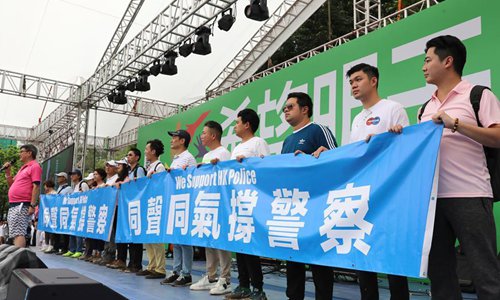HOME >> OPINION
The futility of violence in Hong Kong
Source:Global Times Published: 2019/8/7 21:02:05

People take part in a rally to denounce violence and support police force at Victoria Park in Hong Kong on August 3, 2019. Tens of thousands of Hong Kong residents gathered at a park on Saturday afternoon to express their strong opposition to violence and firm support to the police force. (Xinhua/Wu Xiaochu)
Protests in Hong Kong have lasted nearly two months. How the unrest will end remains uncertain.
The demonstrations began in opposition to the proposed amendments of Fugitive Offenders Ordinance and the Mutual Legal Assistance in Criminal Matters Ordinance. On June 15, Hong Kong Chief Executive Carrie Lam Cheng Yuet-ngor announced that the legislative process on the bill would be immediately suspended. In fact, the Hong Kong Special Administrative Region (HKSAR) government heard the public request, and made concessions in the early days of the protests. As the bill was "dead" and the request of the protesters answered, there should be no reason for more demonstrations to follow, let alone for the use of violence.
However, what we have seen are a series of protests with violence. Accusing law enforcement of abusing their authority in mid-June, protesters surrounded Hong Kong police headquarters on June 22 and June 27. Police downplayed the incidents, and both incidents went without major confrontation. But on July 1, a group of protesters shocked the world by storming into the Legislative Council complex and destroyed equipment inside the chamber of the building.
This was a watershed moment for the movement. The Hong Kong government dispersed crowds and condemned the violence, arresting only a small number of violent protesters. This encouraged protesters to continue their assault on the government and authorities.
Following the incident, protesters adopted a so-called peaceful approach. Every time after the majority of peaceful demonstrators went home, violent demonstrators took over, continued to block the roads, and violently resisted the police who tried to restore order.
The extradition bill is no longer at the center of the protests as quite a few media have predominantly focused on police's use of force for "cracking down" on "peaceful democratic movement." Protesters continuously escalated their acts of violence under the guise of so-called peaceful, rational and nonviolent rallies.
If one could get away with a serious crime like attacking the legislature, violence in the garb of peaceful demonstrations is even more difficult to contain. The police have exercised great restraint when enforcing the law. The Hong Kong police are perhaps the only police force in the world that announce the number of rubber bullets and tear gas they use to disperse the stubborn and violent protesters every time. Tolerance has not stopped violence, but encouraged it!
Investments are flowing to Singapore, small and medium-sized businesses are suffering losses, and public safety is under serious threat.
What's next? Persistent street violence or crackdown by police, either way Hong Kong's economy will suffer. And yet, who will bear the consequences? It is the ordinary citizens who need to feed their families and cannot afford to participate in demonstrations, not those who have been preaching so-called democracy on the streets.
From the anti-extradition bill protests to the movement of "Reclaim Hong Kong! Revolution of our time," the protests have deviated from their original pursuit, and are now directed at Hong Kong secession. Hong Kong was ceded to the UK because the latter invaded China during the First Opium War. Hong Kong's return to the motherland was a victory against colonialism. However, protesters were seen waving US and UK flags while defacing China's national emblem.
So what does "reclaiming" mean? Reclaim Hong Kong from China? So that Hong Kong can once again become a British colony, or maybe a US colony this time? Does democracy mean to make Hong Kong dependent on the US or the UK?
What is the revolution they have launched? Have the protesters offered progressive revolutionary ideas in accordance with the time? Other than anti-government and anti-mainland sentiment, there has been no voice or new claims addressing the burning issues of the current time. Issues such as housing, salary, work hours and conditions, pensions, welfare, and wealth disparities are deeply entrenched problems in Hong Kong. Yet in the past two months, did the protesters raise any concerns about these problems? No. They seem to believe democracy is the panacea that can heal anything as long as they overthrow Carrie Lam and elect the new chief executive by general election.
The protesters have demanded democracy by violently attacking the police who are trying to maintain order, and spreading verbal and physical abuses against Chinese mainland students and tourists. No wonder they hold US flags with passion. This is exactly the kind of democracy with US characteristics. Remember how the US has provoked wars all over the world in the glorious name of democracy.
The movement is destroying Hong Kong's social order, stability, and prosperity, all for the ridiculous purposes of "reclaiming" Hong Kong once again as a colony and of achieving democracy by violence. If Hong Kong's future is in the hands of this group of ignorant young people, the prospects are worrisome.
The author is a lecturer based in Hong Kong and writes on the condition of anonymity. opinion@globaltimes.com.cn
Posted in: VIEWPOINT